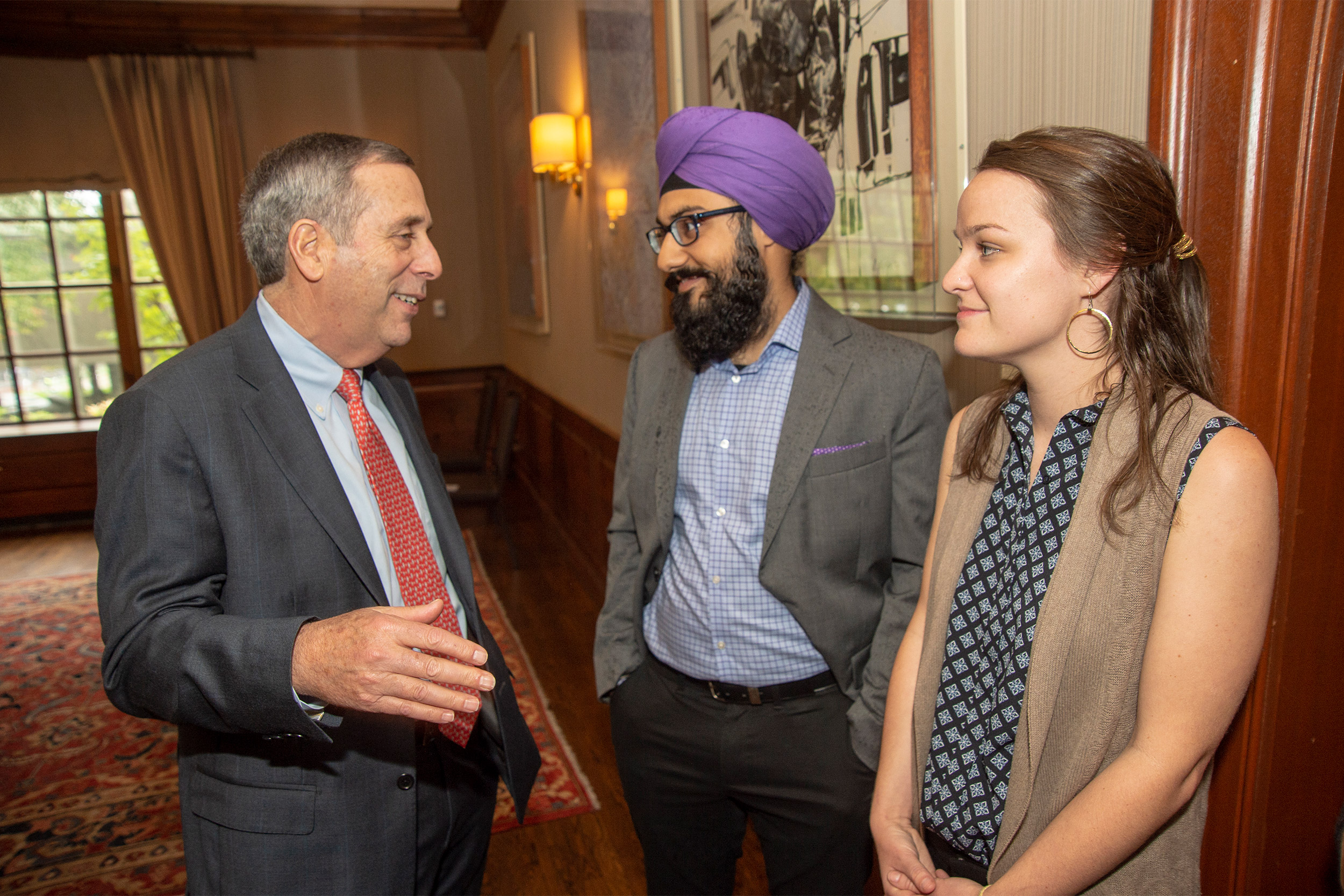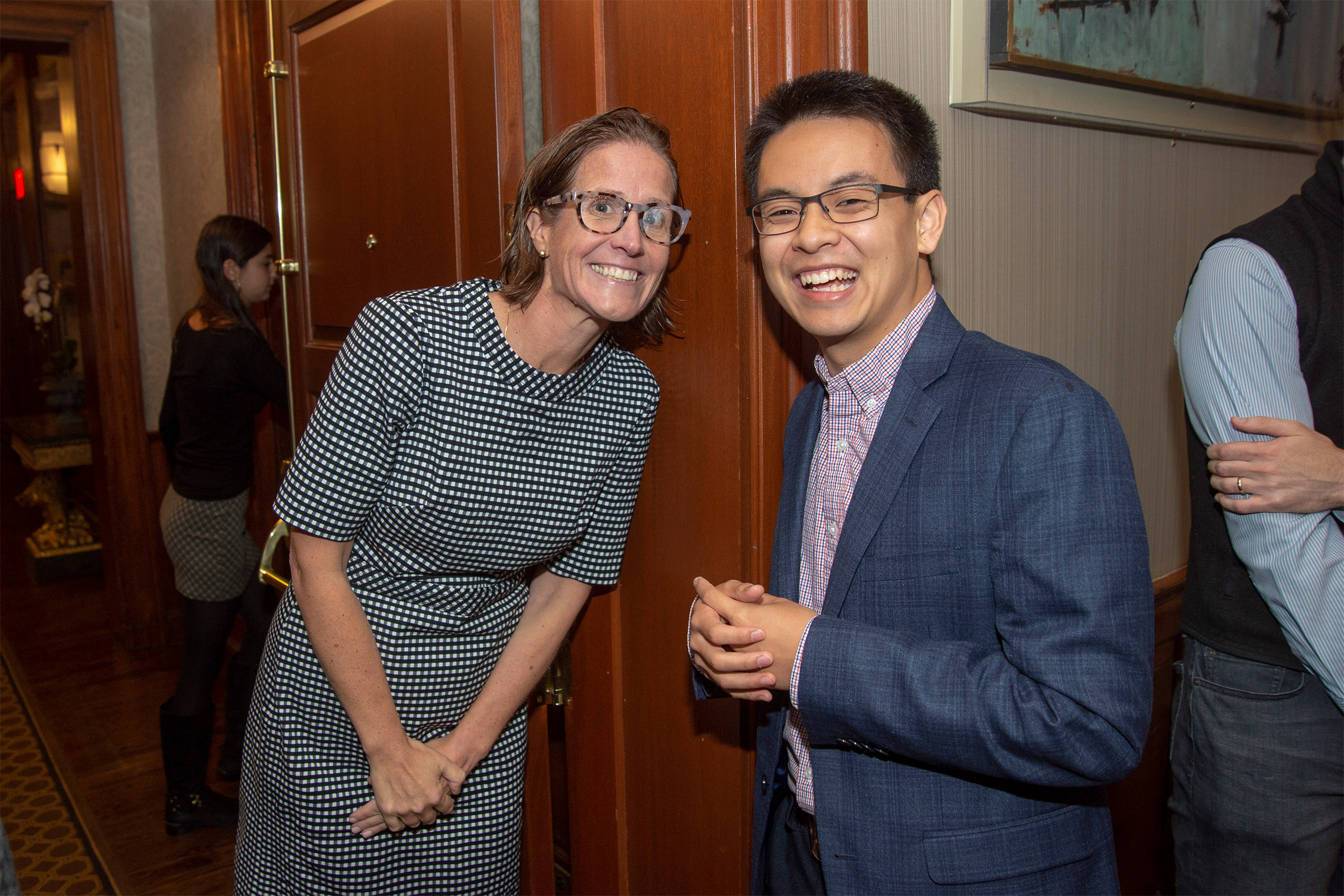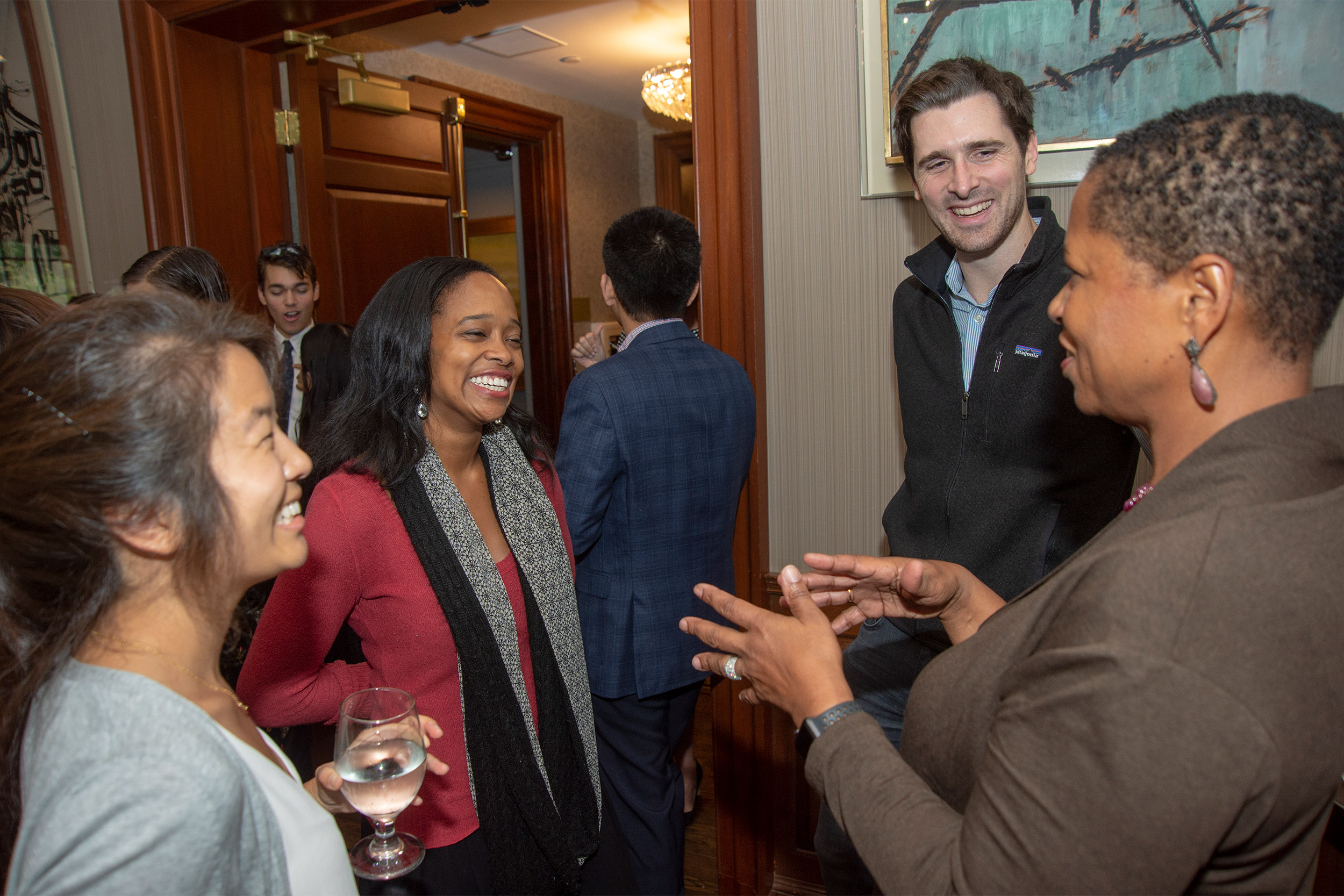
President Larry Bacow (from left) speaks with fellows Harmann Singh, a student at Harvard Law School, and Sarah Bourland, from the Harvard T.H. Chan School of Public Health, at the annual Presidential Public Service Fellowship luncheon.
Photos by Jon Chase/Harvard Staff Photographer
Presidential Public Service Fellowship has broad reach
Supports all facets of public service, from arts to human rights
From helping bring technical innovations in government agencies to working to address threats to natural resources, for sixteen Harvard students, this summer offered a hands-on opportunity to drive change and strengthen needed services in their broader communities.
Now in its eighth year, Harvard’s Presidential Public Service Fellowship (PPSF) lets students pursue summer-long projects serving the public good with organizations of their choice. The fellowship supports experiences across the spectrum of public service, including education, arts, and government, social service, and human rights organizations.
PPSF is the only public service fellowship or internship program at the University that includes both undergraduate and graduate students and extends to all of Harvard’s Schools. As a result, in addition to making service a University-wide priority, it fosters relationships among students who share a passion for public interest work but likely wouldn’t cross paths otherwise.
Speaking to this year’s fellows at a luncheon in September, President Larry Bacow reaffirmed the University’s commitment to public service. “I happen to think that no matter what somebody does with their Harvard degree — a doctor, a lawyer, an engineer, a teacher — whatever you do, each of us has an obligation to be an active, engaged, effective citizen,” said Bacow. “I hope that everybody who graduates from Harvard would understand that with the privilege of studying at a place like this comes the responsibility to engage, to help make the world, our country, our communities, better places, and the Presidential Public Service Fellows are leading the way.”

The work of this year’s PPSF cohort spanned not only the University, with students from seven of Harvard’s Schools, but also the country, with fellows working in eight states and Washington, D.C.
Chris Kuang, a junior studying applied mathematics and economics, spent the summer continuing his work with Coding It Forward, a nonprofit he started in January 2017 that helps foster mission-driven technical internships for computer science, data science, and design students.
Based in Washington, D.C., for the summer, Kuang focused on Coding It Forward’s Civic Digital Fellowship, a fully funded, first-of-its-kind internship for students to bring technical innovations to government agencies. Kuang helped place 36 undergraduate and graduate students, spanning 30 different colleges and universities, in data science, product management, and design internships across six different federal agencies, providing opportunities for students who might not ordinarily think their skill sets would be applicable to civil service and bringing new talent to the agencies. These interns spent the summer building tools to help veterans, diplomats, health care patients, and students — groups who rarely benefit from the forefront of technical innovation.
For Kuang, the chance to help others discover and pursue positions in government agencies and departments made the most meaningful impact. “I think it all comes back to recognizing the immense opportunities and privilege that we have to be at an institution like Harvard that values public service and gives its students the occasion to pursue it,” he noted. “For me, it was not just how do I take advantage of those opportunities, but how can I hopefully use them to empower the journeys of so many other students and inspire them to serve as well.”
HLS student Jessica Zhang (from left); HLS/HKS student Imani Franklin; HKS/HBS student Ned Shell; and Patti Bellinger, the president’s chief of staff, at the Faculty Club luncheon.

Sarah Sadlier, a Graduate School of Arts and Sciences Ph.D. student specializing in American and Native American history with a secondary field in studies of women, gender, and sexuality, spent her fellowship in Bismarck, N.D., working for the Lakota People’s Law Project (LPLP). LPLP was originally established to investigate South Dakota’s violations of the Indian Child Welfare Act in Lakota communities, but has since expanded its efforts to address other threats to Lakota land and resources.
Sadlier, a Miniconjou Lakota whose ancestors lived on the Standing Rock Sioux Reservation and Cheyenne River Sioux Reservation, spent her fellowship with the LPLP defense team of water protectors at Standing Rock, primarily conducting interviews with Lakota and Dakota people on reservations to understand their experiences in the No Dakota Access Pipeline movement.
The direct impact of applying her academic studies to real-world issues is something Sadlier said was evident to her throughout her work this summer.
“No matter what field we are in, I think it is crucial for students to continuously interrogate how our work originating in ivory towers will benefit those we are purporting to serve,” Sadlier said. “The Presidential Public Service Fellowship supplies an opportunity to consider careers and ways in which we can do that.”
Other students’ summer projects ranged from working with the city of Philadelphia’s Department of Commerce and the North Carolina Department of Health and Human Services, to environmental education with the Earth Island Institute in Berkeley, Calif., to education policy research in Jackson, Miss., and confronting human rights abuses in criminal and immigration detention facilities in the American South with the Southern Center for Human Rights in Atlanta.
Harvard College Dean of Students Katie O’Dair, a member of the fellowship selection committee, noted, “We are very pleased with the varied experiences the fellowship provides both undergraduate and graduate student participants. While furthering their own educations and contributing to the missions of the organizations they serve, the participants also act as ambassadors for public service at Harvard, inspiring others across the University.”
To learn more about the Presidential Public Service Fellows, visit the fellowship website. To view a complete list of this year’s fellows, click here.




